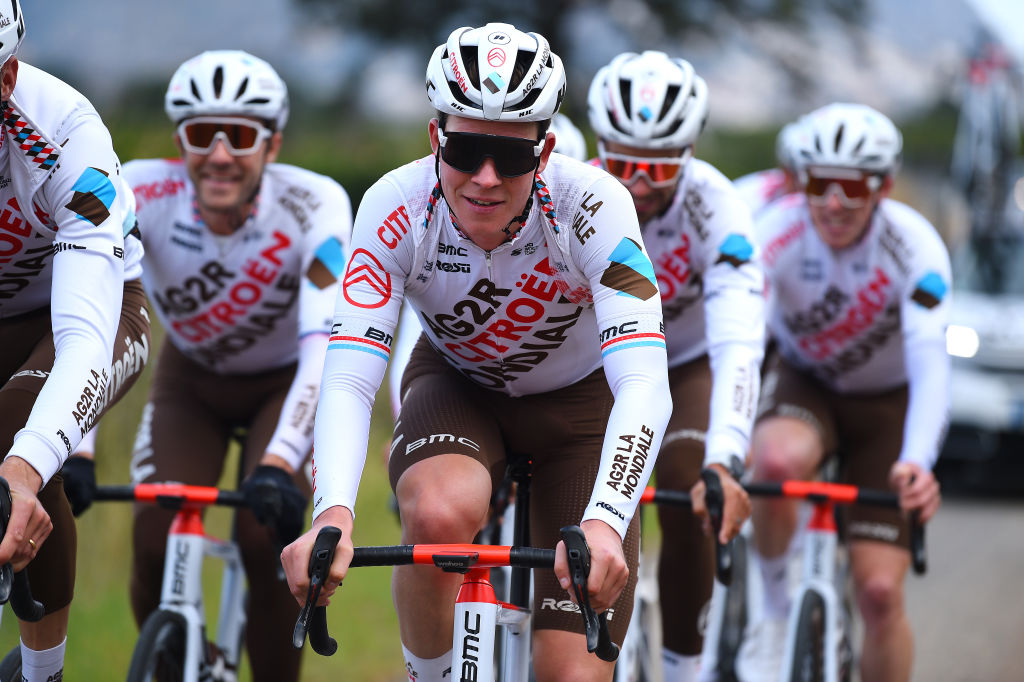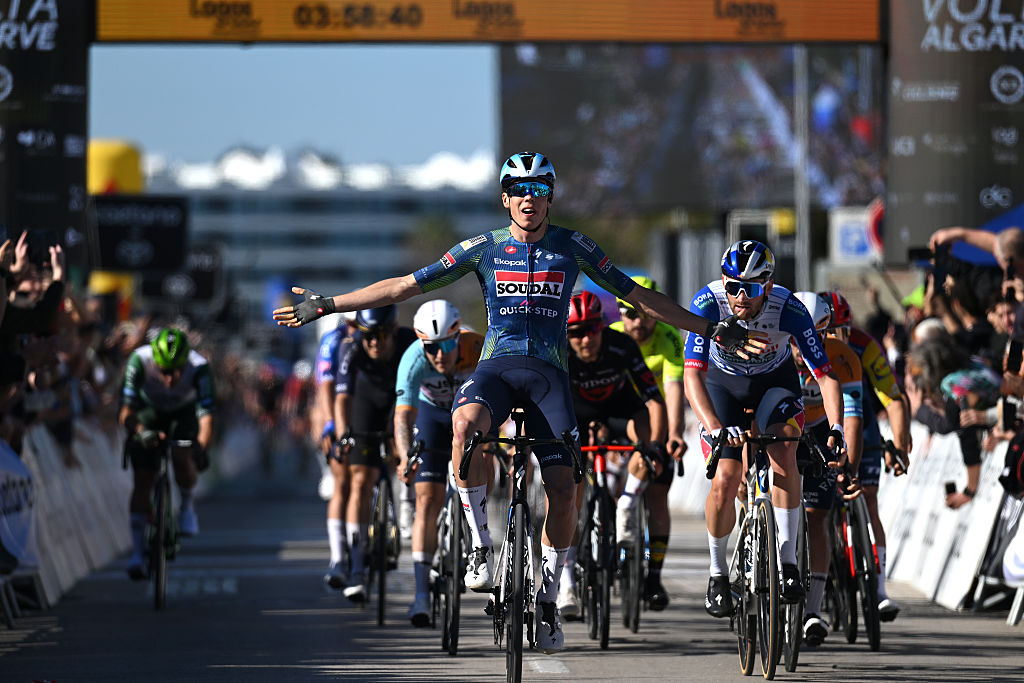Bob Jungels: The search for good surprises after arterial endofibrosis
All rounder discusses next phase of his fightback and his ambitions for 2022

The latest race content, interviews, features, reviews and expert buying guides, direct to your inbox!
You are now subscribed
Your newsletter sign-up was successful
For Bob Jungels (AG2R-Citroën), much of the last six months has been spent dealing with the fallout from an injury that effectively had wrecked the last two years of his career.
As the 29-year-old discussed in a revealing interview with Cyclingnews last November, a diagnosis of arterial endofibrosis last summer answered a lot of questions about why he had suffered such a major drop-off in results and condition in 2021, 2020 and even before. The diagnosis also left Jungels wondering about how he would be able to recover and how full that recovery would be.
A successful operation in the summer, followed by some of the strongest rides he’d had in nearly two years in the final late autumn races in France augered well. But now with the winter over and the new season on the point of starting, the bar could start to rise again.
Speaking during a recent team training camp in Spain, the former Liège-Bastogne-Liège winner and stage race rider discusses the final instalments of the long path back from his injury over the winter and what his hopes and aspirations are for 2022.
CN: You have had a very tough couple of years, but you’ve found the reasons, you came back in the French autumn Classics and you were looking good there. How are you feeling now and how has your winter been?
BJ: Yes, 2021 was a difficult one and actually the last two or three years were not so good because obviously the injury prohibited any kind of crazy performance. So I was very happy to find out what the problem was and also to be able to race again at the end of the season and to prove to myself that I was still able to be up there. Also for the team and for everybody else involved. So Paris-Tours was important for me.
Then after that I had a regular winter break from the bike, even though I hadn’t trained through the summer as usual. Just because mentally it was very tough and for the body, with all the surgery, it was still good to have a proper off season.
The latest race content, interviews, features, reviews and expert buying guides, direct to your inbox!
So I’ve got my winter training done, no health problems so I am fresh now and could do what I needed, and on top of that I’m very happy with how things are going with the team. So for now and for the moment, nothing wrong with the current situation.
CN: Which is actually good news in itself.
BJ: Yes.
CN: When you spoke to Cyclingnews back in November you said the important thing for 2022 would be to have a good, normal year and it didn’t matter where you performed best. But now you’ve had this period of good training and rest, perhaps you’re looking at more specific goals again?
BJ: Well if you look at my program, it’s quite specific. I start in UAE, which is always a bit of a complicated race, but then I’m doing Tirreno as my first objective. I’ve been on the podium before then and it’s a race that should suit me. But I’m not in a position now to name any positions or numbers, I just want to get back to being the rider I was before this injury.
I believe in my capabilities and there’s obviously still pressure, I’m establishing my own goals for myself. And together with the team we’ve decided I should take it step by step for now and enjoy being on the bike. That’s important right now, just. getting back t that level. Then afterwards we can talk about results and positions and victories. Hopefully.
CN: When journalists ask you what you might achieve, do you wish they’d shut up a bit more and first let you get back into racing?
BJ: I’m obviously very happy that people still think I can do something because over the last few years there have been people who didn’t believe in me any more. And that belief that I can do something has given me a lot of strength.
I actually think it’s normal, this is a competitive job and obviously everybody is looking for results and victories. I wouldn’t be sitting here if I thought i would never win big races again.
CN: When it comes to Liège, for example, perhaps your win people most remember, is the plan to go there sharing the leadership at AG2R-Citröen with Benoit Cosnefroy?
BJ: Every year I race Liège it’s on the target list. It’s probably my favourite one-day race. Just because I’ve won it before doesn’t meant I dont’ want to win it again. I think the competition in one-day racing is more intense: a lot of Grand Tour riders are now doing them so if I can get in that mix again I’d be very happy.
But there are other Classics, too, like San Remo and Flanders. All those races should on paper somehow suit me, at least Flanders. But step by step and I’ll try not to get disappointed any more. Just hope for good surprises.
CN: So if I called this year a voyage in the dark, would that be correct?
BJ: I hope so. Like I said, I hope to be the rider I was to be before that injury but I also hope to be better. I know I haven’t reached my limit. I hadn’t reached it before I was injured so like I said, nobody knows what is potentially possible. But I keep believing in myself, so does the team and that’s the most important thing. I’ll take it as it comes because I have no idea what is going to happen.
CN: This is a contract year for you but I’m guessing you haven’t begun discussions with the team yet. Is it fair to say that what’s mattering the most for now is you’re getting a lot of support from them?
BJ: Absolutely. I’m very grateful for the way they’ve been handling the whole situation. Obviously I’ve been employed to be one of the team leaders and I wasn’t able to do that last year so I’m just grateful for that. I haven’t thought about contract negotiations yet for the team but Paris-Tours was a good indication of what could be and should be possible. Like you said, they’ve been very supportive, they trust me. I couldn’t ask for more. Everybody just hopes I will be back to my pre-injury level so we’ll see what’s possible.
CN: Just to go back to the injury briefly, are there types of races, like Grand Tours, that you’re maybe feeling a little more nervous about? Could that be more risky than, say, a week long stage race or is that not the case with this kind of condition?
BJ: I don’t think it’ll come back in such a short period of time. I’m no expert, I might be wrong, but I don’t think a Grand Tour will maybe provoke more stress than two one-week stage races. But like I said, I’m no expert. I don’t know. That’s why I’m getting checkups like the one next week to make sure everything is ok. But the surgeon [who performed his operation] told me I should be fine for ten years and I hope he’s right.
Alasdair Fotheringham has been reporting on cycling since 1991. He has covered every Tour de France since 1992 bar one, as well as numerous other bike races of all shapes and sizes, ranging from the Olympic Games in 2008 to the now sadly defunct Subida a Urkiola hill climb in Spain. As well as working for Cyclingnews, he has also written for The Independent, The Guardian, ProCycling, The Express and Reuters.

